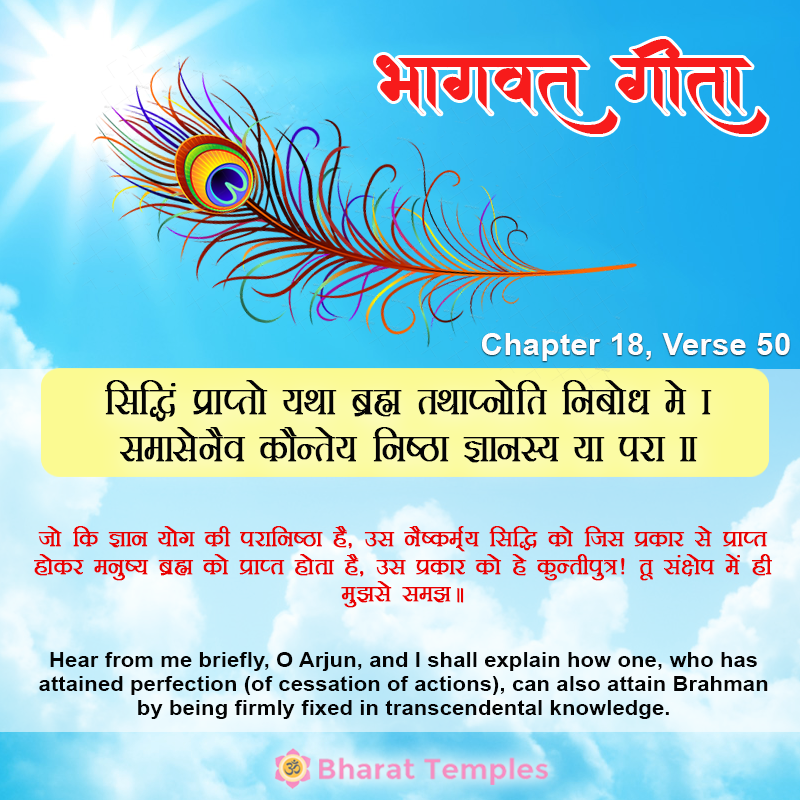Contents
सिद्धिं प्राप्तो यथा ब्रह्म तथाप्नोति निबोध मे |
समासेनैव कौन्तेय निष्ठा ज्ञानस्य या परा ||
siddhiṁ prāpto yathā brahma tathāpnoti nibodha me
samāsenaiva kaunteya niṣhṭhā jñānasya yā parā
भावार्थ:
जो कि ज्ञान योग की परानिष्ठा है, उस नैष्कर्म्य सिद्धि को जिस प्रकार से प्राप्त होकर मनुष्य ब्रह्म को प्राप्त होता है, उस प्रकार को हे कुन्तीपुत्र! तू संक्षेप में ही मुझसे समझ॥50॥
Translation
Hear from me briefly, O Arjun, and I shall explain how one, who has attained perfection (of cessation of actions), can also attain Brahman by being firmly fixed in transcendental knowledge.
English Translation Of Sri Shankaracharya’s Sanskrit Commentary By Swami Gambirananda
18.50 Nibodha, understand for certain; me, from Me, from My utterance-. Is it elaborately? The Lord says, no, samasena, in brief; eva, indeed, O son of Kunti, how siddhim praptah, one who has achieved success, one who, by worshipping God through one’s duties, has achieved success in the form of fitness of the body and organs for steadfastness in Knowledge, which comes from His grace; (-the reiteration of the phrase siddhim praptah is meant for introducing what follows; what is that succeeding subject for which this reiteration stands is being answered:) yatha tatha, that process by which, that process in the form of steadfastness in Knowledge, by which that process of aciring steadfastness in Knowledge by which; apnoti, attains; brahma, Brahman, th supreme Self-.
In order to point out-as ‘It is this’-the realization of Brahman which was promised in, ‘that process by which one৷৷.attains Brahman,’ the Lord says; ya, which; is the para, supreme; nistha, consummation, i.e. the supreme culmination; jnanasya, of Knowledge. Of what? Of the knowledge of Brahman. Of what kind is it? It is of the same kind as the realization of the Self. Of what kind is that? As is the Self. Of what nature is It? As has been described by the Lord and the Upanisadic texts, and established through reason.
Objection: Is it not that knowledge takes the form of its object? But it is not admitted anywhere that the Self is an object, or even that It has form.
Pseudo-Vedantin: Is it not heard of in such texts as, ‘radiant like the sun’ (Sv. 3.8), ‘Of the nature of effulgence’ (Ch. 3.14.2) and ‘Self-effulgent’ (Br. 4.3.9), that the Self has form?
Objection: No, because those sentences are meant for refuting the idea that the Self is of the nature of darkness. When the Self is denied of possessing forms of substance, ality, etc., the contingency arises of the Self’s being of the nature of darkness. The sentences, ‘radiant like the sun,’ etc. are meant for ruting this. And this follows from the specific denial of from by saying, ‘Formless’ (Ka. 1.3.15), and from such texts as, ‘His form does not exist within the range of vision; nobody sees Him with the eye’ (Ka. 2.3.9: Sv. 4.20), ‘soundless, touchless’ (ka. 1.3.15), etc. which show that the Self is not an object of perception. Therefore it remains unproved that there can be any knowledge which takes the form of the Self. How, then, can there be the knowledge of the Self? For, all knowledge that there can be with regard to objects assumes their respective forms. And it has been said that the Self has no form. Moreover, if both knowledge and the Self be formless, then how can there be the consummation [Firmness in Self-realization.] of the (repeated) contemplation on that (knowledge of the Self)?
Vedantin: No. Since it can be established that the Self is supremely taintless, pure and subtle, and it can also be established that the intellect can have taintlessness etc. like the Self, therefore it stands to reason that the intellect can take a form resembling the consciousness of the Self. The mind becomes impressed with the semblance of the intellect; the organs become impressed with the semblance of the mind; and the body becomes impressed with the semblance of hte organs. Hence it is that the idea of the body itself being the Self is held by ordinary people. The Lokayatikas (materialists), who hold that the body is identical with consciousness, say that a person is a body endowed with consciousness; so also there are others who say that the organs are identical with consciousness; there are others who say that the mind is identical with consciousness, and still others who say that the intellect is identical with consciousness. Some accept as the Self the Unmanifest [The inmost Ruler (antaryamin), possessing a semblance of Consciousness.], called the Undifferentiated, which is more internal than that (intellect) and is within the domain of (primordial) ignorance. Indeed, in every case, beginning from the intellect to the body, the cause of mis-conceived Selfhood is the semblance of the Consciousness that is the Self. Hence, knowledge about the Self is not a subject for injunction.
What then? Only the eradication of the superimposition of name, form, etc., which are not the Self, is what has to be undertaken, but not the knowledge of the Self that is Consciousness. For it is the Self which is experienced as possessed of the forms of all the various objects that are superimposed (on It) through ignorance. It is evidently because of this that the Buddhists who uphold the view of (momentary) consciousness have concluded that there is no substance at all apart from (momentary) consciousness, and that it is not in need of any other valid proof since they hold that it is self-cognized. Therefore, what is to be undertaken is only the elimination of the superimposition on Brahman through ignorance, but no effort is needed for knowing Brahman (Consciousness), for It is ite self-evident! It is because the intellect is distracted by particular appearances of name and form imagined through ignorance that Brahman, even though self-evident, easily realizable, nearer than all else and identical with oneself, appears to be concealed, difficult to realize, very far and different, But to those whose intellect has become free from external appearances and who have obtained the grace of a teacher and serenity of mind, there is nothing more blissful, manifest, well known, easily realized and nearer to oneself than this Self. And thus it has been declared, ‘directly realizable, righteous,’ etc. (9.2).
However, some wiseacres assert that the intellect cannot comprehend the entity called the Self since It is formless; hence, complete steadfastness in Knowledge is impossible. This is truly so for those who have not associated with a traditional line of teachers; who have not heard the Upanisads; whose intellects are too much engrossed with external objects; and who have not applied themselves diligently to the perfect means of knowledge. For those, on the other hand, who are the opposite of these, it is absolutely impossible to have the idea of reality with regard to empirical objects, which are within the realm of duality involving the knower and the known, because in their case there is no perception of any other thing apart from the Consciousness that is the Self. We have already said how this is certainly so and not otherwise. It has been stated by the Lord also, ‘That during which creatures keep awake, it is night to the seeing sage’ (2.69).
Therefore, the cessation of the perception of differences in the form of external things is alone the cause of resting in the reality of the Self. For, that which is called the Self is never an object which is not well known, attainable, rejectable or acceptable to anyone at any time. Were that Self to be indeed not self-evident, all activities would become meaningless. [According to Ast. the latter portion of this sentence is: svarthah sarvah pravrttayah vyarthah prasajyeran, all activities meant for one’s own benefit would become meaningless.-Tr.]. For it cannot be imagined that they could be undertaken for unconscious objects like the body etc. Besides, it cannot be that pleasure is for pleasure’s sake, or that sorrow is for sorrow’s sake. Moreover, all empirical dealings are meant for culminating in the realization of the Self. [According to B.S. 3.4.26, ‘On the strength of the Upanisadic sanction of sacrifices etc. all religious activities as well are necessary৷৷.’, sacrifices etc. are meant for leading to the realization of the Self, without which they would become meaningless.] Therefore, just as for knowing one’s own body there is no need of any other (external) means of knowledge so also there is no need of any other means of knowledge, for the realization of the Self which is innermost (in relation to the body etc.). Hence it is established that steadfastness in the knowledge of the Self is a fact very well known to the discriminating people.
Even to those who hold that knowledge is formless and not cognized by direct perception, cognition of an object is dependent on knowledge. Hence it has to be admitted that knowledge is as immediate as pleasure etc. And this follows also from the impossibility of a desire to know (knowledge). Had knowledge been not self-evident, it could have been sought for like any object of knowledge. And in that case, as [This is Ast.’s reading; others read tatha.-Tr.] a knower seeks to perceive through knowledge such objects of knowledge as pot etc., similarly the knower would have sought to perceive knowledge through another knowledge! But this is not the case. Therefore knowledge is ite self-revealing, and for the very same reason the knower also is self-revealed. Hence, effort is not needed for knowledge, but only for the removal of the notion of what is not-Self. [In place of anatma-buddhi-nivrttau, Ast. has ‘anatmani atma-buddhi-nivrttau, for the termination of thinking what is not the Self as the Self’.-Tr.] Conseently, steadfastness in Knowledge is easy of accomplishment.
It is being stated how this supreme consummation of Knowledge is to be attained:












